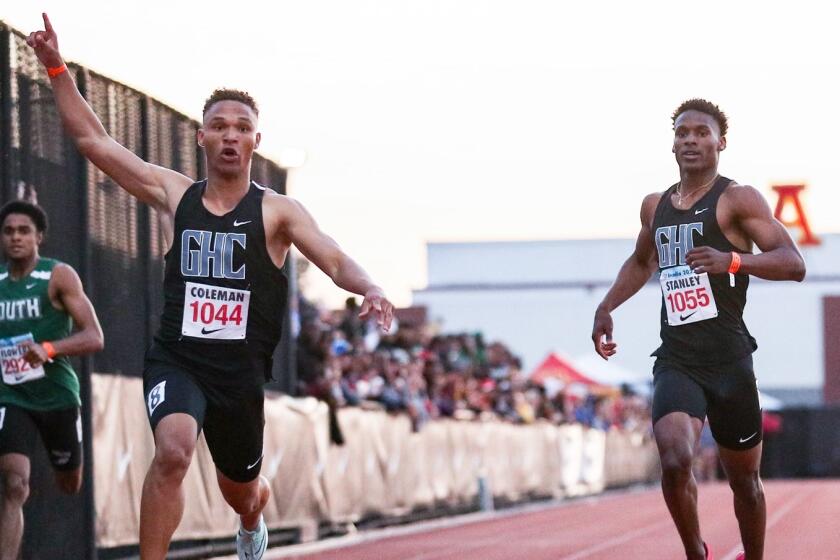Girl Gets Special ‘Blessing’ for Football Game Prayer : Religion: Federal judge intervenes for Texas senior. Louisiana, Arkansas had also been affected by a court ban.
Seventeen-year-old Marian Lynn Ward looked out at Santa Fe High’s packed football bleachers Friday night and did what she’d wanted, what she’d promised--and what she needed a last-minute court order to do.
In a husky voice that balked with nervousness, she invoked God in a pregame “inspirational message” to her peers, teachers and neighbors.
The contents of the brief statement by the small-town pastor’s daughter formed the eye of a legal, cultural and political storm that continued swirling right up to the eve of the game, when a federal court effectively gave Ward permission for her pre-football game prayer.
Such invocations had previously been ruled illegal in Texas. Hours before Ward’s address, though, in response to a lawsuit filed on her behalf, a U.S. district judge in Houston granted a temporary restraining order, barring Ward’s school from punishing her if she defied a previous court’s ruling by giving a prayer.
Judge Sim Lake said the district guidelines “favor atheism over any religion” and therefore amounted to “state-sponsored atheism.”
By sunset, when Ward finally gave her address, about 4,000 people had jammed into the high school stadium. Clad in her green band uniform, the sandy-haired teenager haltingly declaimed her prayer. Asking for a safe game and goodwill in the audience, she concluded her address “in Jesus’ name.”
Almost instantly, the audience rose to its feet to roar and clap its approval. Fellow members of the Santa Fe band jostled around her to swap high-fives. Then Ward hoisted up her trumpet to help churn out “The Star-Spangled Banner.”
The dispute has reverberated far beyond Santa Fe. Effective in Louisiana and Arkansas as well as Texas, an appeals court ban on football game prayer provoked several instances of civil disobedience in Texas, where pregame prayers are a longtime tradition. In Andrews, near Odessa, trustees planned to continue student-led prayer at their games, despite the appeals court’s ban. Last week, 15 students in Stephenville, in Central Texas, led an unauthorized prayer at a game via a portable public address device spirited into the stadium.
From the Gulf Coast to the Panhandle, Friday nights have special meaning in this state: It’s high school football night, the occasion for entire towns to show what they hold dear as their children battle outside teams on the gridiron or parade their discipline in halftime bands or cheerleader routines.
Santa Fe, about 30 miles southeast of Houston, first confronted school prayer tradition in 1995, when two families anonymously sued the Galveston County school district to end its tradition of student-led prayers before graduation and football games. The families, one Mormon and one Catholic, alleged several episodes of religion-based harassment their children had experienced in the Santa Fe school system.
After a bitter lawsuit, the U.S. 5th Circuit Court of Appeals in New Orleans decreed that prayer could still be used to “solemnify” Santa Fe High’s graduations--but that football games lacked the “singularly serious nature” to merit public prayer. Even prayers before graduation, the court ruled, had to be nonsectarian and non-proselytizing.
But when Ward was elected to give the pregame message this year, she announced that the invocation would have little meaning without reference to a deity. Then Richard Ownby, the superintendent of the Santa Fe Independent School District, said that any student who violated the court’s ruling would have to be punished.
Though it adhered to the law, Ownby’s warning was unpopular in the mostly Baptist town of less than 10,000. The town had a brush with infamy in the early 1980s, when the Ku Klux Klan surfaced to rally against recently arrived Vietnamese shrimpers. Today, the orderly community attracts newcomers for its relatively inexpensive land and green space.
“We get calls from the community quite often supporting prayer [before games],” said school district secretary Ann Kemmerling, “but we have few calls, if any, saying they don’t support prayer before games. It’s been a tradition, and I don’t see any need to change that tradition.”
The few Santa Fe residents who publicly oppose school prayer were dismayed at Friday’s ruling, however.
Even before the 1995 court ruling banning pregame prayers, the town has been an uncomfortable place for residents who oppose the tradition, said one mother who asked not to be named.
“The bottom line is that people can still pray in school--they’re just not supposed to be led while they’re doing it,” said the woman, who asked not to be identified because her school-age child requested it. “Unfortunately, the majority of people in Santa Fe seem to feel that if they’re not led, it’s not praying.”
The ruling also disturbed Anthony Griffin, the lawyer in the 1995 lawsuit. “What you have is a brother-in-law suit,” he said. “You have the school district, and the child and the child’s lawyers get together and figure out how to . . . force a contradiction in the law.”
He also criticized Texas school districts that have publicized their flouting of the 5th Circuit rules. “[They’re saying,] ‘We’re going to violate the law, we’re going to pray anyway,’ ” he said. “A wonderful thing to show children.”
After the appeals court ruling earlier this year, Santa Fe’s school district petitioned the U.S. Supreme Court to review the case. Texas Gov. George W. Bush has supported the school district, and the state filed papers opposing the prayer prohibition.
Kelly Shackelford of the Liberty Legal Institute in Dallas said he believes hundreds of other schools planned defiance of the appellate ruling during this football season, ranging from football game invocations to mass recitations of the Lord’s Prayer.
Ownby told reporters that Lake’s decision “took a great burden off of us” because the district never wanted to ban the pregame prayer.
And Santa Fe School Board member Robin Clayton said he did not believe the concept of separation of church and state was anywhere to be found in the Constitution. “Liberals created that term 50 years ago,” he said, according to Reuters.
Though school administrators say Ward probably would have received detention at most for her prayer, the controversy it reflects goes to the very roots of American culture, said Raymond A. Eve, a sociologist at the University of Texas at Arlington.
“I call it a struggle for the means of cultural reproduction,” said Eve. Those involved in such battles, he said, are asking, “Do I have the right to teach my values to my own children?”
Get our high school sports newsletter
Prep Rally is devoted to the SoCal high school sports experience, bringing you scores, stories and a behind-the-scenes look at what makes prep sports so popular.
You may occasionally receive promotional content from the Los Angeles Times.


